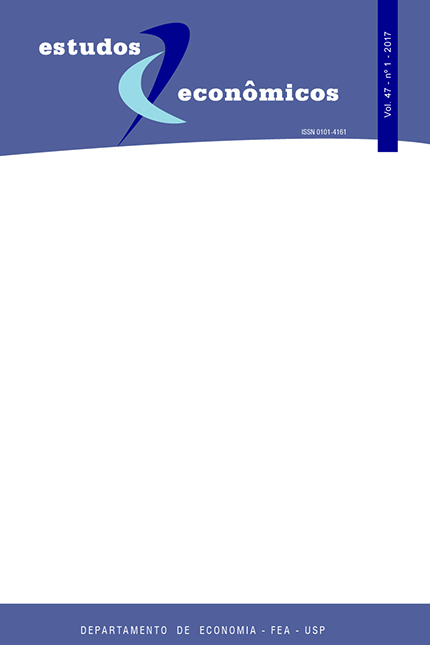Heterogeneity of demand and product innovation
DOI:
https://doi.org/10.1590/0101-416147115trmPalavras-chave:
Demanda, Informação, Heterogeneidade, Inovação, Modelo evolucionárioResumo
Este paper discute o relacionamento entre a heterogeneidade da demanda em relação a critérios de escolha e à inovaçao de produto. É proposto um modelo evolucionário que apresenta como consumidores com informação imperfeita escolhem e selecionam bens diferenciados. O modelo conecta a informação e os critérios de escolha e sua relação com o processo inovativo das empresas. Como resultados, pode-se verificar que o preço apresenta uma importante função, mas a qualidade da informação, os erros de tolerância dos agentes e critérios para ordenação de preferência são importantes determinantes do desempenho das firmas em uma indústria com inovação de produtos.
Downloads
Referências
AKERLOF, G. A., “The Market for ‘Lemons’: Quality Uncertainty and the Market Mechanism.” Quarterly
Journal of Economics, 84(3), pp. 488-500, 1970.
AVERSI, R., DOSI, G., FAGIOLO, G., MEACCI, M., OLIVETTI, C.Demand Dynamics With Socially
Evolving Preferences. Industrial and Corporate Change, 8(2), 353-408, 1999.
CAVES, R. E. & PORTER, M. E. “From Entry Barriers to Mobility Barriers: Conjectural Decisions
and Contrived Deterrence to New Competition”. The Quarterly Journal of Economics, Vol. 91,
No. 2. (May, 1977), pp. 241-262, 1977.
GIGERENZER, G. Adaptive thinking: Rationality in the real world, Oxford Universtiy Press.
GIGERENZER, G. & GOLDSTEIN, D. (1996), “Reasoning the Fast and Frugal Way: Models of
Bounded Rationality”, Psychological Review, 103(4), pp. 650–69, 2000.
GIGERENZER, G., SELTEN, R., eds. Bounded rationality: The adaptive toolbox, MIT Press, 2000.
KAUFFMAN, S. A. The Origins of Order: Self-Organization and Selection in Evolution, Oxford
University Press, 1993.
LUNDVALL, B. Innovation as an interactive process: from user-producer interaction to the national system of innovation. In: DOSI, G et al. (eds) Technical change and economic theory. Pinter, London, 1988.
MALERBA, F., NELSON, R., ORSENIGO, L., WINTER, S. Demand, innovation, and the dynamics of
market structure: The role of experimental users and diverse preferences. Journal of Evolutionary Economics, 17, 371-399, 2007.
METCALFE, J. S. Consumption, preferences, and the evolutionary agenda. Journal of Evolutionary Economics, 11(1), pp. 37-58, 2001.
NELSON, P. Information and Consumer Behaviour, Journal of Political Economy, 78(2), pp. 311–329, 1970.
NELSON, P. Advertising as Information. The journal of political economy, 82.4, 729-754, 1974.
NELSON, R. Demand, supply, and their interaction on markets, as seen from the perspective of evolutionary economic theory. Journal of Evolutionary Economics, 23, 17-38, 2013.
NELSON, R., CONSOLI, D. “An evolutionary theory of household consumption behavior”, Journal of Evolutionary Economics, 20(5), pp. 665–87, 2010.
OLSHAVSKY, R. W., GRANBOIS, D. H. Consumer Decision Making – Fact or Fiction? Journal of
Consumer Research, 6, 93-100, 1979.
PORTER, M. E. “How competitive forces shape strategy”, Harvard business Review, March/April, 1979.
PORTER, M. E. Competitive Strategy, Free Press, New York, 1980.
SAVIOTTI, P. P. Variety, Growth and Demand. Journal of Evolutionary Economics, 11(1), pp. 119-142, 2001.
SIMON, H. A. A Behavioral Model of Rational Choice. The Quarterly Journal of Economics, v.69, n.1, (feb.1955), pp. 99-118, 1955.
SIMON, H. A. From Substantive to Procedural Rationality. In.: LATSIS, S. J. (ed.), Method and Appraisal
in Economics, Cambridge: Cambridge University Press, pp. 129-148, 1976.
SIMON, H. A. Rationality as process and as product of thought. American Economic Review, 68(2), pp. 1-16, 1978.
SIMON, H. A. Rational Decision Making in Business Organizations. [Nobel Memorial Lecture], American Economic Review, 69(4), September, pp. 493-513, 1979.
SLOVIC, P. Choice. In.: Osherson, D. N., Smith, E. E. (eds) An Invitation to Cognitive Science. MIT Press: Cambridge, MA, 1990.
STIGLER, G. The economics of information, Journal of Political Economy, 69(3): 213–25, 1961.
THALER, R. H. The Winner’s Curse: Paradoxes and Anomalies of Economics Life. Free Press: New York, 1992.
TVERSKY, A., KAHNEMAN, D. Rational Choice and the Framing of Decisions. Journal of Business, 59, 251-278, 1986.
VALENTE, M. Evolutionary Demand: a Model for Boundedly Rational Consumers. Journal of Evolutionary Economics. 22, 1029-1080, 2012.
VALENTE, M. An NK-like Model for Complexity. Journal of Evolutionary Economics. 24, 107-134,
WILLIAMSON, O. E. “Transaction Cost Economics”, in Handbook of Industrial Organization, Volume I, Edited by R. Schmalensee and R.D. Willing, Elsevier Science Publishers, 1989.
WINDRUM, P., BIRCHENHALL, C. Is product life cycle theory a special case? Dominant designs
and the emergence of market niches through coevolutionary-learning. Structural Change and
Economic Dynamics, 9, 109-134, 1998.
WINDRUM, P., CIARLI, T., BIRCHENHALL, C. Consumer heterogeneity and the development of
environmentally friendly technologies, Technological Forecasting and Social Change, 76(4),
pp. 533–51, 2009.
Downloads
Publicado
Edição
Seção
Licença
Copyright (c) 2017 Thiago Caliari, Ricardo Machado Ruiz, Marco Valente

Este trabalho está licenciado sob uma licença Creative Commons Attribution-NonCommercial 4.0 International License.
A submissão de artigo autoriza sua publicação e implica o compromisso de que o mesmo material não esteja sendo submetido a outro periódico.
A revista não paga direitos autorais aos autores dos artigos publicados.





 Atualizado em 14/08/2025
Atualizado em 14/08/2025